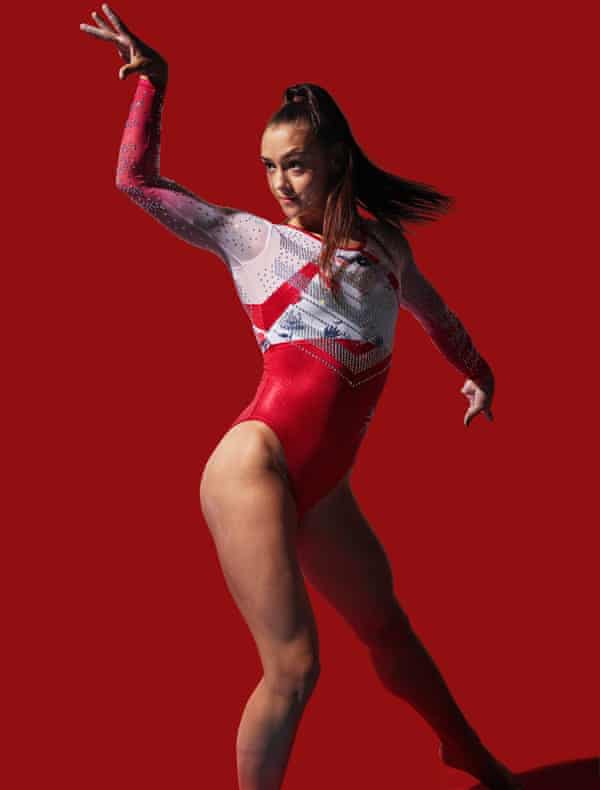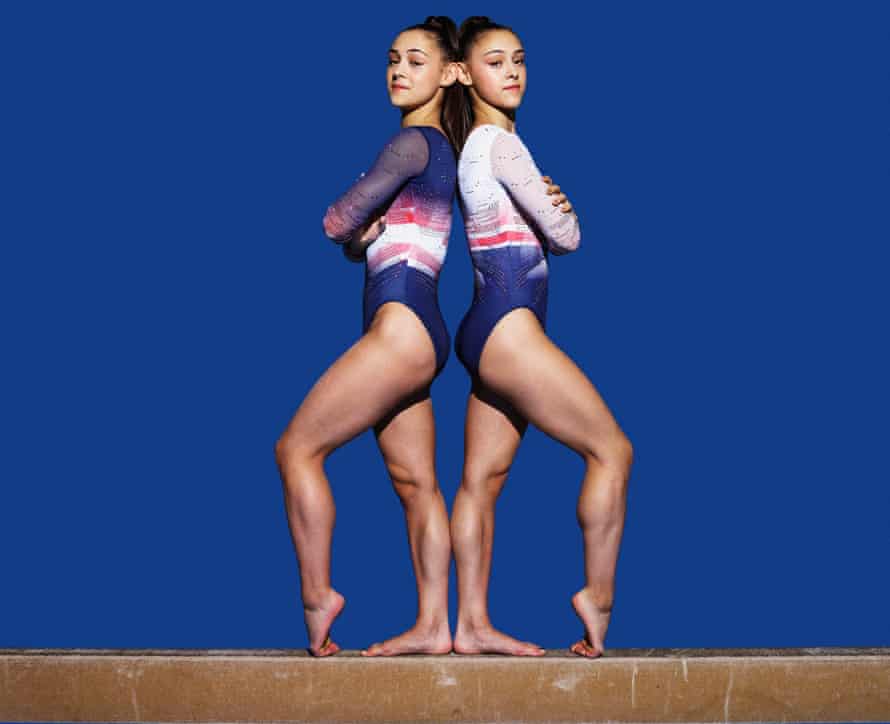
Early on a Friday morning in a large, open gymnasium in Aylesbury, Buckinghamshire, Jessica and Jennifer Gadirova are standing a few metres apart on a springy blue floor, preparing for takeoff. They have convinced the photographer to shoot them doing handsprings. The hope is that they will coordinate so well, the camera will capture the identical twins in identical poses mid‑air; backs arched like horseshoes, hands about to reach the floor, legs stretched, feet pointed like ballerinas. The countdown begins. On a second-floor viewing platform, a crowd of parents and small children, here for a preschool gymnastics class, watches in anticipation. Three, two, one. The children are transfixed, probably unaware they are watching two Olympic bronze medallists in action. The jumps look coordinated enough to me – but did it work for the camera? Not this time, it turns out.
This is the Gadirova twins’ first magazine photoshoot and I can feel their excitement. In addition to acrobatics on the floor, they suggest poses on the beam and bars – all sorts of kicks, handstands and jumps. Their Olympic-level work ethic shines through. “I could get my leg straighter,” Jessica suggests after doing a kick on a beam, and back on it she hops. When it’s time for a solo portrait, the twin not being photographed will take her phone and proudly document the other’s turn in the spotlight. There’s a fierce commitment to equality between them. If the photographer places one twin in front, they’ll ask for another set of pictures, this time switching places. “We’re the twins, but it’s nice to be recognised as individuals,” Jennifer tells me later.
One of my friends said, ‘I knew you always trained. I never knew what you were training for’
Jessica and Jennifer won over the public even before the Tokyo Games began. They were identical 16-year-old students who had just finished their GCSEs, and about to live their Olympic dream. Just stepping on to that flight to Tokyo – the longest plane ride they’d been on – caused butterflies. For everyone watching from home, the Gadirovas’ excitement was visible in the way they tumbled, cheered and hugged each other, and stood on the podium to receive bronze for Britain in women’s team gymnastics (the country’s first medal in the event in 93 years). Watching them prepare to compete, I was struck by how much younger than everyone else they looked. Though as they stepped up to perform, that distinction vanished. Twisting in the air and hanging on bars, they appeared completely at ease, delighted to show the world what they could do.
Since coming back, they’ve attended the premiere of the new James Bond film, appeared on Blue Peter, had two purple double-decker buses in Aylesbury named after them, and turned 17. People pay for their meals at restaurants and ask for autographs (“I don’t feel that special,” Jessica says). And their friends have finally realised what the twins are up to when they say they’re at practice. “One of my friends said, ‘I knew you always trained. I never knew what you were training for,’” Jessica says with a smile. Jennifer nods. “People in my class, a few years back, were like, ‘How good are you at gymnastics?’”
Jessica and Jennifer began training aged six. Their parents, Natig and Iona, moved from Azerbaijan to London in 2001, then to Dublin for work in 2004, where the twins were born, before moving to Coventry. There, they were put in classes. “We were crazy kids just jumping on everything,” Jessica remembers. Their mum and dad, who runs a small logistics company, “put us into loads of sport, but gymnastics is the one we stuck with and loved the most”. They moved to London, then to Aylesbury when they were 12, where they continued intense training in gymnastics. What do they love about it? “The big amazing skills,” Jennifer says. “I love to perform, go to these big competitions and show the world what I can do.”
The twins found out they had been selected for the Olympics only in May. Getting to that moment involved an arduous training regime, made more complicated by Covid. A case in their school last winter drove home the seriousness of the pandemic – and its potential impact on the twins’ Olympic dreams. Though the school remained open, they got permission to take their classes and GCSEs remotely. When lockdown restrictions meant they could not train in the gym, they brought equipment home and practised in their garage. Did they get bored of being stuck at home, unable to see their classmates? “We did have each other,” Jessica replies, looking at her sister. “She’s my best friend.”
Their bond is strong. Throughout our conversation, they’ll often look at each other, back each other up and finish each other’s sentences, although they like to be seen as individuals. It’s said that Jennifer is the quiet one and Jessica the loud one: when I’m there, Jessica enthusiastically documents the photoshoot for Instagram. They’re full of energy and are particularly animated when talking about Tokyo or the strangeness of their new fame. What do they do apart? There’s a pause. “Um,” they both say. “That’s hard.” Then Jessica adds: “I feel like we do nearly everything together.”

How did they feel when standing on the podium? “Shock, disbelief,” Jennifer begins. “Just so many emotions flowing through, like happiness,” Jessica continues. “You feel like you’re on top of the world, you’re in shock, you’re in a dream.”
Going into the Games, many eyes were fixed on Simone Biles, who has dominated women’s gymnastics for the past seven years and was expected to triumph. But after faltering on the vault during the women’s team final, Biles pulled out, citing medical issues. Updates on her condition were issued daily: she dropped out of the floor, vault and uneven bars, before returning to win bronze on the balance beam. The story was followed across the world, but it had a direct impact on the Gadirovas. Jennifer was first reserve on the women’s floor final, and Biles’s withdrawal allowed her to compete. “I was thrilled because floor is my favourite,” she says. She had been preparing for the possibility as she knew Biles was struggling, but adds: “I did feel bad for Simone.” Being at the same competition as their longtime hero was its own reward; Biles was due to retire after Tokyo, though she has recently hinted she may leave “the door open” for future competitions. “We’re at the beginning of our career and she’s just about to finish hers,” Jennifer says. “Not many people can say they’ve stood on the podium with their idol.”
Biles later revealed that in pulling out of the Games she wanted to protect her mental health, explaining: “There were a couple of days when everybody tweets you and you feel the weight of the world.” Her decision was taken during a time when more athletes are speaking out about their wellbeing. Tennis star Naomi Osaka tried to skip press conferences at the French Open this year, citing mental stress. She was fined $15,000 and threatened with suspension before withdrawing from the tournament. In an essay explaining her decision, Osaka wrote: “Athletes are humans.” Before her US Open triumph, 18-year-old Emma Raducanu retired from Wimbledon after experiencing breathing difficulties, saying her successful run had “caught up with me”. All three have faced criticism. Conservative and rightwing pundits called Biles “weak” and “selfish” and told Raducanu to “toughen up”; some suggested Osaka was a hypocrite for continuing to appear on magazine covers while skipping post-game conferences.
The twins, however, found these moments inspiring. Far from being selfish or weak, they signalled to younger athletes that they, too, can take care of themselves in a world that is often competitive and demanding. “It’s good that they are speaking out,” Jessica says, “because it can help the next generation understand that if they are having a problem … ” “They can speak up for themselves,” Jennifer jumps in, finishing her sister’s sentence.

At Tokyo, the Gadirovas found they were no longer simply young gymnasts looking starry-eyed at seasoned names. “It’s mind-blowing that we’re just as good as them,” Jessica says. Former British gymnastics champion Craig Heap, who was a BBC commentator during Tokyo, describes the Gadirovas’ style as “powerful, dynamic and yet full of grace and beauty”, adding: “There’s been a real shift in the sport in recent years for power over grace … but what the Gadirovas have got is a bit of both.” Heap was especially impressed by how they held their nerve: “They seemed absolutely fearless. That confidence going forward is going to propel them.”
Have things calmed down for the twins since the first round of post-Olympic adulation? A little, Jessica says, before adding: “I don’t think it’s ever going to go back to normal.” It has been exciting riding the wave of their newfound fame. At the Bond premiere, they sat in front of Stormzy and gave him their popcorn – it was infused with alcohol, so they weren’t allowed to eat it. “We said we were Olympic bronze medallists,” Jennifer says, “and he was like: ‘I have so much respect for you guys, because gymnastics can be really hard.’ We just started … ” She looks at her sister. “Fangirling,” they say together.
For now, they’re back to juggling gymnastics, their studies, and being teenagers. After spending a morning flipping and kicking their way through today’s photoshoot, they’re off to school. They have just started sixth form, studying sport and management, which they say feels much more manageable than GCSEs – they can use their free periods to do more gymnastics. Like many 17-year-olds, they are looking forward to learning how to drive. More atypically, they are laser-focused on the next round of international competitions. I ask what they’re training for. “The 2022 Commonwealth Games, European and World Championships,” they rattle off in unison. And Paris 2024, I ask? “Yes, with a gradual increase to Paris,” Jessica says with a little smile. I get a sense that in terms of their ambition, they’re only just warming up: there’s so much more the Gadirovas plan to do, and want to prove.
